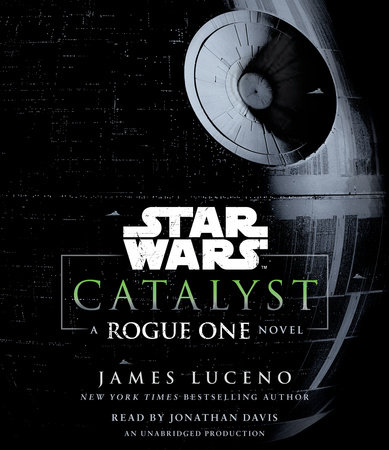We’re less than a month out from Rogue One and discovering just what a non-Saga, “anthology” Star Wars film looks like. Lucasfilm seems to be dipping its toe in the non-Saga pool gently, giving us a story — the theft of the plans to the first Death Star — separate from but still intrinsically linked to the original Star Wars film. In the meantime, to whet our appetites and give us some backstory for the characters we’ll meet in the film, Legends and Tarkin alum James Luceno has brought us Catalyst, the story of Galen Erso and Orson Krennic (Mads Mikkelsen and Ben Mendelsohn in the film, respectively) and how their unlikely friendship led to the development of the galaxy’s most powerful weapon.
Random House has consistently released audiobook versions of the novels in the new canon, and Catalyst is no exception. Catalyst is performed by Jonathan Davis — not the lead singer of Korn, but the veteran of more than four hundred(!) audiobook recordings, over of thirty of which were under the Star Wars banner.
So, how does Catalyst work — as a stand-alone novel, as a film prelude, and as an audiobook production? Read on to find out!
When the book began, I had a moment of dread. “A LONG TIME AGO,” Davis intoned in a melodramatic growl, “IN A GALAXY FAR FAR AWAYYYYYYY.” Fortunately, it was an affectation. As the novel proper began, Davis reverted to a much more normal tone, and I began to relax.
Catalyst spans about four years, from about a year into the Clone War to a year after, and is primarily the story of Galen Erso and Orson Krennic, the scientist and engineer, respectively, most responsible for the design and construction of the Death Star. Luceno walks a fine line creating a believable friendship between the two men based on mutual trust and respect, while at the same time describing in no uncertain terms Krennic’s all-encompassing ambition and his blatant manipulation of his friend Galen to serve that ambition. Galen Erso is the galaxy’s foremost authority on Kyber crystals, it turns out — Kybers being not only what powered the now-defunct Jedi Order’s lightsabers, but possibly the only source of energy potent enough to power the Death Star’s still-theoretical superlaser. The problem is that Galen Erso is a highly moral individual who is so opposed to weapons research, he spent the last year of the Clone War in a Separatist prison, separated from his wife and newborn child, rather than design weapons for them. He’s no more eager to design weapons for the Empire, and so the book becomes Krennic’s long con of slowly drawing Erso into the Death Star project without Erso ever being aware of what he’s actually working on.
The book is not terribly plot-heavy, but I was neither hoping or expecting it would be. That does not mean, however, that it’s plagued by the structure and pacing problems we’ve seen in other books in the new canon — most notably, Luceno’s own Tarkin. Tarkin failed because the novel never felt like it was building to anything — even some personal revelation or turning point in Tarkin’s internal life — and because Luceno neglected to make the gaunt Moff a compelling protagonist. Here, Catalyst is buoyed by the presence of a built-in ticking clock — the construction and completion of the Death Star — but even beyond that, Luceno succeeds wonderfully at creating rich, vibrant internal lives for his characters. Galen and Orson, certainly, but also Lyra, Galen’s wife, as well as a smuggler named Has Obitt, who starts as someone reluctantly recruited by Krennic, but becomes something much more by the end of the novel. The novel’s structure is not solely reliant on the countdown to Rogue One and A New Hope, either — Luceno creates arcs for Krennic as well as for both Ersos which propel the story to a conclusion that some may find surprising — which itself is surprising, given how much we know about what follows.
Luceno’s characters aren’t perfect; Lyra Erso is an interesting character, but can sometimes feel like she’s vacillating between the docile, dutiful wife who drops everything for her husband’s career (she transcribes his research notes, for pity’s sake) and the “ball busting” no-fun angry wife trope seen in so many terrible sitcoms. Part of the latter is simply due to Krennic’s perspective, but the Lyra POV segments are few enough that it’s hard sometimes to get a sense of Lyra’s character beyond her relationship with Galen. What we do get is interesting — see below — but more exploration of her character would have been welcome.
One thing this novel does very well, which we don’t see a lot of in Star Wars, is offer a non-Jedi perspective on the Force. Galen’s scientific inquiries into the Kyber crystals are interesting enough — and wonderful counterpoint to the mystical (at times too mystical) perspective we got in Ahsoka) — but what’s really great is Lyra’s view of the Force. She’s not a Force-user herself, but she’s nonetheless reverent — of the Jedi, the Kybers, and the Force itself. How she views and experiences the Force as a non-Jedi is really interesting, and a wonderful look at religion and faith in the Star Wars universe.
None of this would be worth a hill of beans (space beans?) if the narration was subpar. Fortunately, Jonathan Davis’ many years of recording audiobooks has paid off with a nearly flawless performance. His diction is clear and his voice is buttery smooth. His voices are mostly distinct — although there were a couple conversations between Krennic and Tarkin I found difficult to follow. There were one or two moments where Davis seemed way too excited about a fairly benign piece of text, and a couple times when a little more excitement wouldn’t have been unwarranted, but for the most part he manages to convey an appropriate level of excitement or emotion without straying into melodrama or histrionics. Luceno’s prose is smooth and elegant, and extremely well-suited to the audiobook format.
The production itself is mostly good; if you’ve read my reviews of the Ahsoka or Life Debt audiobooks, you’ll know I sometimes find the production on these Star Wars audiobooks intrusive. And for the most part, that’s not a problem here. The music still pops up at odd moments, with selections from John Williams’ scores that can often seem inappropriate to the passage. Background sound effects are mostly used judiciously and to good atmospheric effect, although an echoing effect applied to character voices during a scene in a cave was distracting, and an ongoing klaxon sound in another scene was incredibly annoying. The droid and alien voices aren’t over-produced for the most part, but there is a Geonosian character who has not only a filter applied to his dialogue, but pops and whistles approximating the Geonosian language as well, and that can be a bit much. These are mostly minor complaints, however; for the most part, the production is unintrusive and well-done.
Catalyst is short, just a smidge over 11 hours, but its length and pacing are perfect for a book of this nature. Luceno strikes just the right balance of character and plot — not creating a plot so byzantine or significant in a self-conscious attempt to justify the book’s existence, but neither crafting an aimless wander akin to his last Star Wars novel, Tarkin. If you’re someone who complains about the “filler” episodes of Star Wars Rebels, Catalyst might not be for you, but if you want to know what makes Galen Erso and Orson Krennic tick, and glean some insight into the forces that shape Jyn Erso’s life, then I highly recommend this novel. Additionally, the audiobook is a wonderful way to experience Luceno’s prose, and I can highly recommend this format, as well.
It got something of a slow start, but the novel series in the new canon is steadily improving. I appreciate what they’re trying to do with these novels, and I’m happy they continue to invest the time and money in creating excellent audio versions of the books for those who are limited to audiobooks for whatever reason, or simply for those who prefer to experience their books this way.




